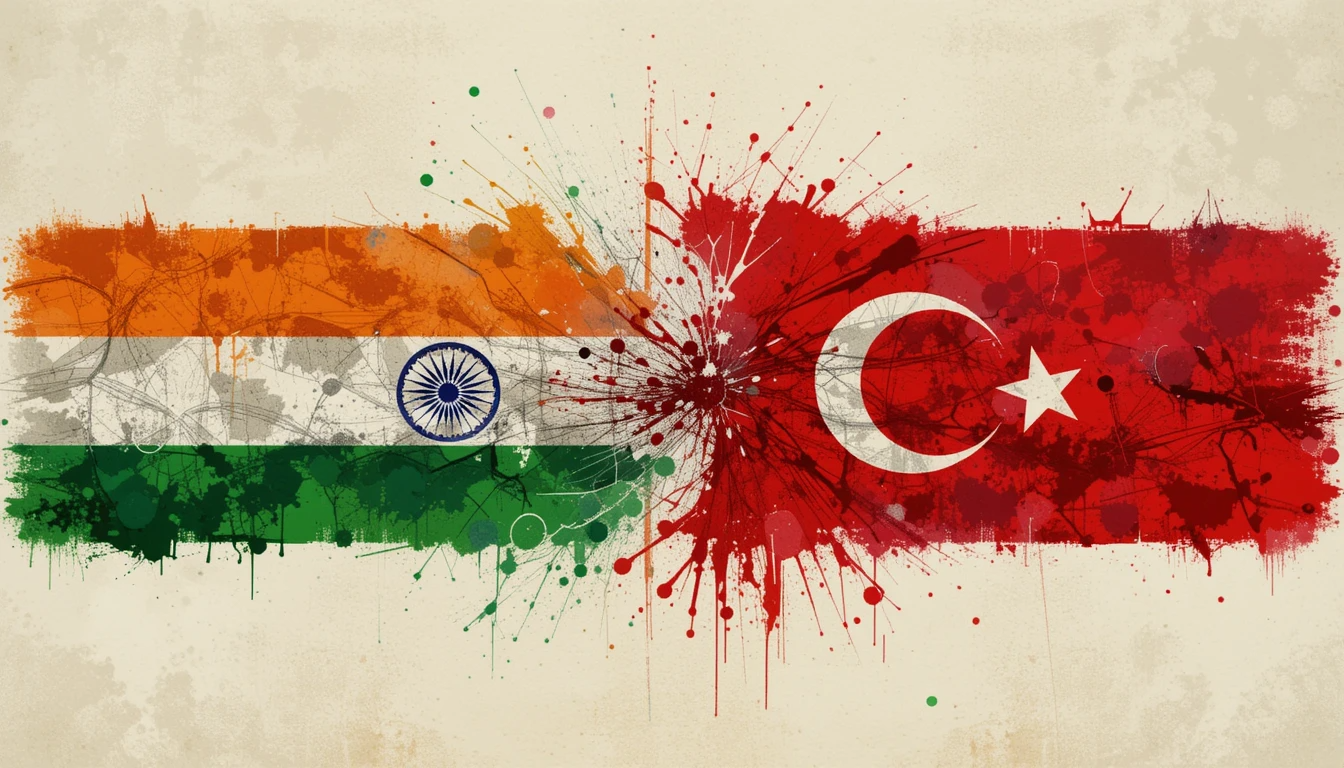
India and Turkey, both key players in their regions, have witnessed a significant cooling of relations in recent years. Although no official boycott has been declared, India has clearly moved to strategically distance itself from Turkey through diplomatic, economic, and military means.
Table of Contents
Here’s a full breakdown of the reasons behind this rift—and what both nations have lost.
🇹🇷 Why Did India Boycott Turkey?
India’s response stems from several actions and positions taken by Turkey that directly challenge India’s sovereignty and strategic interests.
🧾 Summary Table: Reasons Behind India’s Boycott of Turkey
| Reason | Explanation |
|---|---|
| Turkey’s support for Pakistan | Especially on Kashmir at UN and OIC; called for international intervention |
| Anti-India rhetoric | Erdoğan’s speeches accusing India of oppression and injustice |
| Military ties with Pakistan | Joint training, defense cooperation, naval deals |
| Involvement in Indian Muslim issues | Alleged funding of radical Islamic groups and NGOs in India |
| Response by India | Diplomatic freeze, economic pushback, alignment with Turkey’s rivals |
🇮🇳 How India Responded
1. Diplomatic Downgrade
India reduced or canceled high-level bilateral engagements, including PM Modi’s 2019 visit to Ankara.
2. Cancelled Economic & Defense Projects
India canceled a $2.3 billion shipbuilding contract with Turkey’s Anadolu Shipyard, among other deals.
3. Forging Ties with Turkey’s Rivals
India has increased cooperation with:
- Greece and Cyprus
- Armenia
- Israel and UAE
This strategy sends a clear signal to Ankara.
🇹🇷 Reasons Behind India’s Boycott of Turkey
The primary reasons for India’s boycott include:
- Support for Pakistan on Kashmir: Turkey’s vocal support for Pakistan’s stance on Kashmir at international forums like the UN and OIC has been a major point of contention.
- Anti-India Rhetoric: President Erdoğan’s speeches accusing India of oppression have strained diplomatic ties.
- Military Ties with Pakistan: Joint training and defense cooperation between Turkey and Pakistan have raised concerns in India.
- Involvement in Indian Muslim Issues: Allegations of Turkey funding radical Islamic groups in India have further exacerbated tensions.
📉 Economic Losses for Turkey
India’s strategic disengagement has led to significant economic losses for Turkey across various sectors:
💰 Trade Losses
- Defense Contracts: India canceled a $2.3 billion shipbuilding contract with Turkey’s Anadolu Shipyard, citing security concerns.
- Bilateral Trade Decline: India-Turkey trade volume decreased from $13.81 billion in 2022-23 to $10.43 billion in 2023-24, with Turkish exports to India declining by over 17% due to diplomatic tensions. Wikipedia+1IBEF+1
🧳 Tourism Revenue Loss
- Indian Tourist Spending: In 2024, approximately 3.3 lakh Indian tourists visited Turkey, spending an estimated $350-400 million. @EconomicTimes
- Tourism Decline: Following Turkey’s support for Pakistan, Indian travel to Turkey saw a sharp decline, with travel companies reporting a 60% decrease in bookings and a surge in cancellations. Reuters+1@EconomicTimes+1
✈️ Aviation Sector Impact
- Flight Reductions: India revoked security clearance for Turkish ground handler Celebi and is reconsidering leasing agreements with Turkish Airlines, affecting Turkey’s aviation revenue. Reuters
🇮🇳 Comparative Losses for India
While Turkey has faced substantial economic setbacks, India’s losses have been relatively minimal:
- Trade: India’s exports to Turkey stood at $5.54 billion in 2024, with a trade surplus favoring India. Trading Economics
- Tourism: Turkey was a popular destination for Indian tourists, but alternative destinations have gained popularity following the boycott.
- Diplomatic Influence: India’s influence in Islamic forums like the OIC may have been slightly affected, but overall diplomatic standing remains strong.
🔁 Mutual Losses Overview
| Area | India’s Losses | Turkey’s Losses |
|---|---|---|
| Trade | Limited impact due to diversified trade partners | Loss of $2.3 billion defense contract; decline in exports to India |
| Tourism | Shift to alternative destinations | Loss of $350-400 million from Indian tourists |
| Aviation | Minor adjustments in international routes | Reduced flight operations and revenue from Indian carriers |
| Diplomacy | Slight reduction in influence in Islamic forums | Strained relations with a major democratic and economic power |
🧭 Conclusion
India’s strategic boycott of Turkey has led to significant economic losses for Turkey, particularly in trade, tourism, and aviation sectors. While India has experienced some impact, its diversified economic and diplomatic engagements have mitigated substantial losses. The situation underscores the importance of aligning foreign policy with mutual respect and non-interference in internal affairs.





Leave a Reply